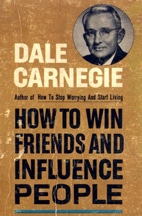 INFLUENCE—EVERYBODY WANTS IT, SOME ACTUALLY HAVE IT.
INFLUENCE—EVERYBODY WANTS IT, SOME ACTUALLY HAVE IT.
INFLUENCE IS THE CURRENCY OF SOCIAL MEDIA.
As part of your social media strategy (yes, you need to have one of those!) have you determined who the “influencers” are in your subject area (and/or your partners’ subject area)? If not, you may be missing a huge opportunity.
In her post, 9 Ways Your Business Needs To Change To Become Social on www.socialmediaexplorer.com, Ilana Rabinowitz presumably saves the best for last, listing “Influence” as #9, stating that “Influence is the new power.” She includes this example:
“The old media had centralized power. They had the power to say, “No,” to your company’s article or press release. They had the power that came from being “it” for information. The new media has influence. A single mom blogger expresses love for your product or concern about your product’s ingredients…might be able to change the behavior of a large portion of her readers. Multiply that times thousands of mom bloggers –some with scores of thousands of readers.”
Interject “cause” into that scenario, and it’s not hard to see the opportunities available to causes/social good initiatives that make it onto the radars of relevant influencers.

Source: www.dictionary.com
The BlogHer 2011 Social Media Matters Study indicates that 53% of women trust information & advice from familiar bloggers (88% for active blog readers) and that blog usage continues to rise at the same rate as social networking:
According to the same study, 58% say sweepstakes are the most enticing online format for women, much more effective than celebrity endorsements (13%). So, consider including a relevant and enticing sweepstakes offer with your appeal to promote your cause initiative and your odds of success should also increase.
MEASURING INFLUENCE
 In addition to opportunities in the blogosphere, you should also be looking for influencers – and understanding your own level of influence – within the four major social media platforms (Facebook, LinkedIn, Twitter and Foursquare).So how do you know who the influencers are, and how influential you are? Social media tools, of course. The standard measurement tool has been Klout, here’s how they describe their services:
In addition to opportunities in the blogosphere, you should also be looking for influencers – and understanding your own level of influence – within the four major social media platforms (Facebook, LinkedIn, Twitter and Foursquare).So how do you know who the influencers are, and how influential you are? Social media tools, of course. The standard measurement tool has been Klout, here’s how they describe their services:
Klout measures influence online: Our friendships and professional connections have moved online, making influence measurable for the first time in history. When you recommend, share, and create content you impact others. Your Klout Score measures that influence on a scale of 1 to 100.
You have Klout in the topics you care about: Klout finds influencers in everything from barbecue to tech gadgets to gardening. Uncover your influence and find people who share your interests.
The Klout Score measures influence based on your ability to drive action. Every time you create content or engage you influence others. The Klout Score uses data from Twitter, Facebook, LinkedIn, and Foursquare in order to measure:
How many people you influence (True Reach)
How much you influence them (Amplification)
How influential they are (Network Score)PeerIndex is another tool that can be used. Check out this blog post by Neal Schaffer on SocialMediaToday.com to learn more about the nuances between PeerIndex and Klout and to see examples of each report side by side. He suggests that there are benefits to using both, as well as to ignoring both-it’s worth a looksee!
Due to the nature of social networking, it is impossible to ever get a “truly accurate” measurement of influence. For example, it is, of course, possible that a person with a low “influence rating” (e.g. they only have a few contacts or aren’t very active on their social media platforms) just happens to be connected to “the right” contact(s) for your cause and, the person, therefore, could become the catalyst for taking your message viral (or achieving any number of other goals).
That said, with limited social media budgets and staffing, some amount of strategic effort taking influence into account could be time well spent. As with any new relationship, know that there will likely be a process of building trust. Make the effort to do that thoughtfully and authentically. Always be informed, relevant and respectful of time when approaching an influencer.
Have you spent any time building relationships with influential bloggers? Who should you be getting to know on the major social media platforms? Are you on their radar yet? Do you know your personal and organizational Klout scores?
TIP:
You can easily see Klout scores on the social media dashboard www.Hootsuite.com by clicking “Show Profile” on the handle that interests you. Yes, it’s that simple!
By law, I believe I am now required to end this post with a quote by Dale Carnegie’s 1936 book, How To Win Friends And Influence People:
“Make the other person happy about doing the thing you suggest.”

